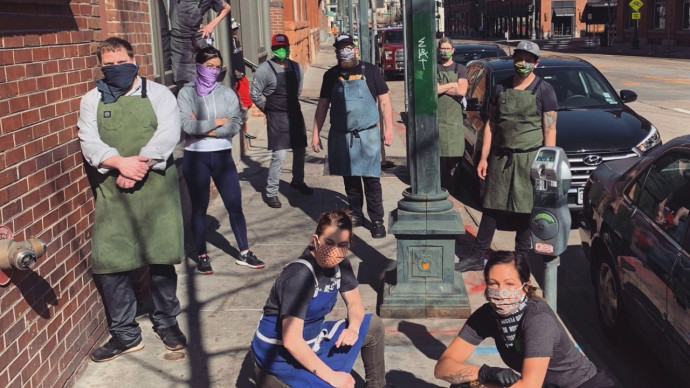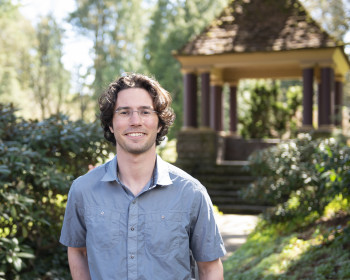Community Response
We caught up with seven Lewis & Clark graduates to learn how they are helping those in need during the pandemic.

The COVID-19 pandemic has completely altered life around the world. As Lewis & Clark responded to the onslaught of COVID-19 in early March, many Pioneers began figuring out what they could do to help those in need.
We caught up with seven Lewis & Clark graduates to learn more about their projects—from the creation of an emergency food network to making PPE gear for frontline workers using a 3D printer—that arose from a global crisis.
Lindsay Yearman BA ’17
Lindsay Yearman BA ’17, a chemistry major and outfielder on the softball team during her time at Lewis & Clark, is now a research assistant at Charles River Laboratories. When COVID-19 hit, the company’s focus quickly shifted to finding a treatment for the virus. “My site’s role is to provide data to show that the drugs being developed are safe to move to clinical trials in humans. We had a hand in developing this one that recently made headlines,” Yearman says.
“I’m in the analytical chemistry department, and we work closely with the formulations department on methods for determining and verifying concentrations and purity of the drugs before they are dosed. We are a part of the process that the FDA looks at when seeing how safe a drug is and if it can go through to the next phase.”
When asked about how her work environment has changed in the last few months, Yearman says that it’s been similar to many other workplaces: social distancing practices, more cleaning procedures, and several employees working from home. “Some studies were pushed to the back burner and replaced with COVID studies,” she explains.
Michael Graham BA ’05 and Landon Mascarenaz BA ’05
In the Denver metro area, thousands of individuals in need have dealt with limited access to food due to COVID-19. Enter the Denver Metro Emergency Food Network (DMEFN), a nonprofit launched in part by Michael Graham BA ’05 and Landon Mascarenaz BA ’05 to deliver safe, free, prepared meals to those in need. The meals are funded by online donations and contributions from local foundations and government agencies.
Since March 18, Graham and Mascarenaz have delivered more than 280,000 free meals to Denver residents through their organization.
Earlier this year, Graham opened Lost City, a community space that includes a coffee shop and restaurant with a social impact mission in partnership with Comal, a nonprofit food incubator that provides training to refugee and immigrant women from Latin America, Syria, Ethiopia, Iraq, and other parts of the world. After the success of DMEFN, Graham decided to partner with other local organizations to start Lost City Market, a pay-how-you-can farmers market featuring independent local vendors.
“After seeing the tremendous impact of DMEFN, we wanted to find another way to address the growing need for affordable, healthy food that also supports local farms and small businesses,” Graham says. “Lost City Market allows attendees to purchase delicious food from local farmers and vendors in a fun and safe environment while remaining accessible to all members of the community.”
Ryan Lockard BA ’07
Ryan Lockard BA ’07 created Specialty Athletic Training nearly eight years ago to help athletes with special needs. During the year, Lockard and his team of trainers operate out of Pamplin Sports Center and three other gyms in Portland, Vancouver, and Bend. When COVID-19 grounded the company’s operations to a halt in early March, Specialty Athletic Training quickly pivoted to offering all of its workouts in virtual sessions. “How are you going to motivate someone via FaceTime or Zoom? We always knew we could do it, but it was definitely the unknown,” Lockard says. “Now we are able to go virtual and offer our training to anyone, anywhere, no matter what’s going on, which is pretty awesome.”
Elizabeth Jaeger BA ’11
In March, New York-based artist Elizabeth Jaeger BA ’11 and a friend at a Manhattan hospital started a campaign for artists to submit illustrations, paintings, and other digital art thanking healthcare workers. The posters have been displayed in intensive care units’ (ICU) break rooms in hospitals throughout New York City, one of the cities hit hardest by the COVID-19 pandemic.
In an article for contemporary art website Hyperallergic, Jaeger says the project is a coping mechanism to battle the “feeling of helplessness” she’s experiencing during the quarantine.
“It’s overwhelming how much our federal government is failing people, and especially the people that work in hospitals with the lack of PPE, ventilators, dialysis machines, and general centralized organization,” she says. “My hope is that the posters bring some lightness to people going through hard days.”
John Kray BA ’17 and Zach Rose BA ’18
Hydra Research, a startup led by John Kray BA ’17 and Zach Rose BA ’18 that provides 3D-printing services to businesses and individuals who need affordable, custom parts, has pivoted almost completely to making personal protective equipment (PPE) for frontline workers over the last few months. The company has made and delivered over 2,200 pieces of PPE including face shields, face masks, and ear savers. Hydra is also distributing sewing masks made from hospital-grade sterilization wrap, which offers an efficient microbial barrier.
More Newsroom Stories
Public Relations is located in McAfee on the Undergraduate Campus.
MSC: 19
email public@lclark.edu
voice 503-768-7970
Public Relations
Lewis & Clark
615 S. Palatine Hill Road MSC 19
Portland OR 97219

